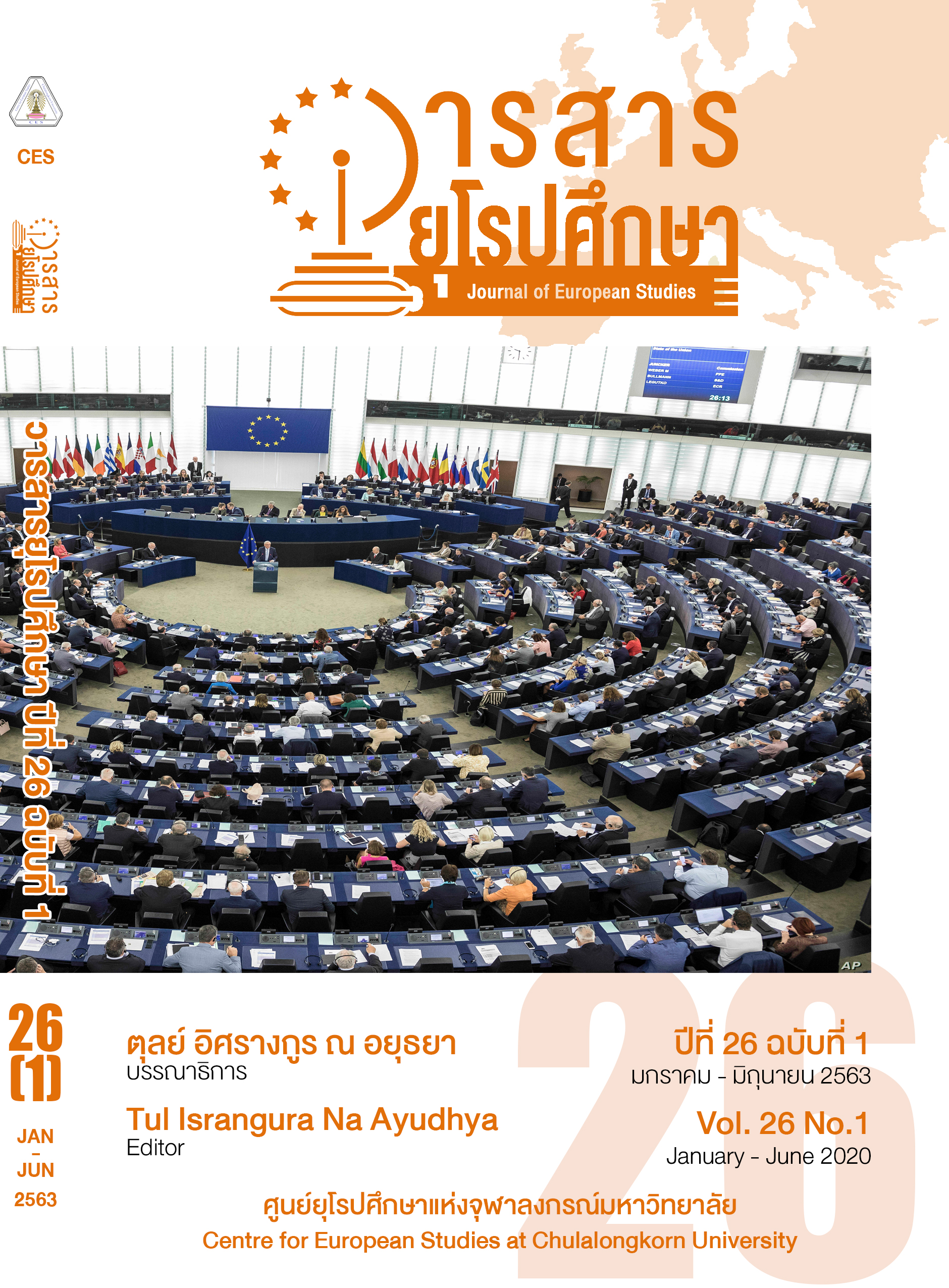อำนาจอ่อนของสหภาพยุโรป:
การส่งเสริมคุณค่าเชิงปทัสถานผ่านการดำเนินนโยบาย เพื่อนบ้านยุโรป
คำสำคัญ:
อำนาจอ่อน, คุณค่าเชิงปทัสถาน, นโยบายเพื่อนบ้านยุโรป, ประสิทธิภาพของนโยบายการต่างประเทศ, รัฐผู้รับหรือรัฐคู่เจรจาบทคัดย่อ
บทความนี้มีจุดประสงค์ในการพิจารณาแนวทางและประสิทธิภาพการใช้อำนาจอ่อนของสหภาพยุโรปผ่านการดำเนินนโยบายเพื่อนบ้านยุโรป (ENP) เพื่อเป็นการเผยแพร่คุณค่าเชิงปทัสถานของตน บทความนี้ใช้นิยามอำนาจอ่อนของ Joseph S. Nye เพื่อทำความเข้าใจลักษณะอำนาจอ่อนอย่างชัดเจน ซึ่งสะดวกในการวิเคราะห์ ซึ่งบทความนี้จะวิเคราะห์นโยบาย ENP ผ่านการทำความเข้าใจจุดประสงค์ในการกำเนิดขึ้นของนโยบาย รวมไปถึงกลไกและเครื่องมือในการนำนโยบายไปปฏิบัติ นอกจากนี้ยังศึกษาประสิทธิภาพของนโยบายดังกล่าว ผ่านกรณีศึกษาสองรัฐซึ่งเป็นรัฐเพื่อนบ้านที่สหภาพยุโรปดำเนินนโยบาย ENP ได้แก่ ยูเครนและตูนิเซีย ผลจากการวิเคราะห์ พบว่านโยบาย ENP มิได้มีประสิทธิภาพในการนำคุณค่าเชิงปทัสถานของสหภาพยุโรปไปเผยแพร่มากนัก แม้จะมีการใช้อำนาจอ่อนของสหภาพยุโรปเป็นแรงขับเคลื่อนสำคัญ อันมีสาเหตุมาจากการที่นโยบายดังกล่าวไม่สามารถโน้มน้าวรัฐผู้รับหรือรัฐคู่เจรจาปฏิบัติตามคุณค่าเชิงปทัสถานของสหภาพยุโรป
เอกสารอ้างอิง
Bohdanova, Tetyana. “Unexpected revolution: the role of social media in Ukraine’s Euromaidan uprising.” European View Vol. 13, (June 2014): 133-142. https://journals.sagepub.com/doi/pdf/10.1007/s12290-014-0296-4.
Comelli, Michele. The Approach of the European Neighbourhood Policy (ENP). Istituto Affari Internazional, 2005. http://citeseerx.ist.psu.edu/viewdoc/download?doi=10.1.1.470.9828&rep=rep1&type=pdf.
Dandashly, Assem.“The EU Quest for a Security Community with the Southern Neighbours: EU–Tunisia Relations.” in External Governance as Security Community Building, edited by Rieker ,Pernille, 135-162 .Palgrave Macmillan, 2016.
Delegation of the European Union to Tunisia. “Tunisia and the EU.” Last modified May 17, 2016.https://eeas.europa.eu/delegations/tunisia/24118/tunisia-and-eu_en (accessed on May 5, 2019).
Delegation of the European Union to Ukraine. “Ukraine and the EU.” Last modified May 16, 2016.https://eeas.europa.eu/delegations/ukraine/1937/ukraine-and-eu_en (accessed on May 5, 2019).
EEAS. “Eastern Partnership.” https://eeas.europa.eu/diplomatic-network/eastern-partnership_en (accessed on May 4, 2019).
ENPI. “Vast majority of Tunisians want greater EU role in their country.” Last modified n.d. http://www.enpi-info.eu/mainmed.php?id=32816&id_type=1&lang_id=450.
EU Neighbours. “European Neighbourhood Policy.” https://www.euneighbours.eu/en/policy (accessed on May 4, 2019).
European Commission. “Euro-Mediterranean partnership.” http://ec.europa.eu/trade/policy/countries-and-regions/regions/euro-mediterranean-partnership/ (accessed on May 4, 2019).
European Commission. “Regional Cooperation.” https://ec.europa.eu/neighbourhood-enlargement/neighbourhood/eastern-partnership/regional-cooperation_en (accessed on May 4, 2019).
European Neighbourhood Policy and Enlargement Negotiations. “The Directorate General.” https://ec.europa.eu/neighbourhood-enlargement/about/directorate-general_en (accessed on May 4, 2019).
European Union.“The history of the European Union.” Last Modified n.d. https://europa.eu/european-union/about-eu/history_en (accessed on May 3, 2019).
Gawrich, A., Melnykovska, I. and Schweickert Rainer. “Neighbourhood Europeanization through ENP: The Case of Ukraine.” JCMS Vol. 48, no. 5 (2010): 1209-1235, https://onlinelibrary.wiley.com/doi/abs/10.1111/j.1468-5965.2010.02110.x (accessed on May 5, 2019).
Hall, Todd. “An Unclear Attraction: A Critical Examination of Soft Power as an Analytical Category.” The Chinese Journal of International Politics Vol. 3 (2010), 189-211. https://doi.org/10.1093/cjip/poq005.
Kuzio, Taras. Theoretical and Comparative Perspectives on Nationalism: New Directions in Cross-Cultural and Post-Communist Studies. ibidem Press, 2014.
Manners, Ian. “Normative Power Europe: A Contradiction in Terms?.” JCMS Vol. 40, no. 2 (2002): 235 – 258. http://www.princeton.edu/~amoravcs/library/mannersnormativepower.pdf.
McClory, Jonathan. The Soft Power 30: A Global Ranking of Soft Power 2018. Portland, 2018. https://softpower30.com/wp-content/uploads/2018/07/The-Soft-Power-30-Report-2018.pdf.
Mattern, Janice Bially. “Why ‘Soft Power’ Isn’t So Soft:Representational Force and the Sociolinguistic Construction of Attraction in World Politics.” Journal of International Studies vol.33, No.3 (2005), 583-6121.
Nielsen, Kristian. “EU Soft Power and the Capability-Expectations Gap.” Journal of Contemporary European Research Vol. 9, no. 5 (2013): 723-739. http://natoassociation.ca/nuclear-non-proliferation-efforts-success-or-failure/.
Nye, Joseph. Soft Power: The Means to Success in World Politics.Public Affairs (Public Affair,2014).
Nye, Joseph. The Future of Power (Public Affair, 2011).
Paciello, Maria Cristina. Tunisia: Changes and Challenges of Political Transition. Medpro, 2011.
http://aei.pitt.edu/59195/1/MEDPRO_TR_No_3_Paciello_on_Tunisia_(1).pdf.
Peera Charoenvattanakul. “Rethinking Soft Power: Problems and Misunderstandings in Applying the Concept in Thailand,” Political Science Review Vol. 4, no. 2 (2018): 253. (in Thai).
Powel, Brieg T. “A clash of norms: normative power and EU democracy promotion in Tunisia.” Democratization Vol. 16, no. 1 (2009): 193-214. https://www.tandfonline.com/doi/abs/10.1080/13510340802575924.
Smith, Karen. “The outsiders: the European neighbourhood policy.” Foreign Affairs Vol. 81, no. 4 (2005): 757-773. https://academic.oup.com/ia/article-abstract/81/4/757/2534896.
Surachart Bamrungsuk, ed. “Soft Power.” Security Studies Booklet Vol. 136-137 (February 2014). http://www.geozigzag.com/pdf/136_137.pdf. (in Thai).
Tulmet, Elsa. “Can the Discourse on “Soft Power” Help the EU to Bridge its Capability Expectations Gap?.” European Political Economy Review Vol. 7, no. Summer (2007): 195-226.
“Ukraine profile – Timeline.” BBC, March 5, 2020. https://www.bbc.com/news/world-europe-18010123 (accessed on March 6, 2020).
Wesselink, Edzard and Boschma, Ron. Overview of the European Neighbourhood Policy: Its History, Structure, and Implemented Policy Measures. Utrecht University Repository, 2012. https://dspace.library.uu.nl/handle/1874/279180.
Wike, R., Poushter, J., and Laura S., et.al. “European Public Opinion Three Decades After the Fall of Communism.”Pew Research Center, October 15, 2019.
https://www.pewresearch.org/global/2019/10/15/european-public-opinion-three-decades-after-the-fall-of-communism/. (accessed on February 28, 2020).
Sarto, Raffaella Del and Schumacher, Tobias. “From Brussels with love: leverage, benchmarking, and the action plans with Jordan and Tunisia in the EU’s democratization policy.” Democratization Vol. 18, no. 4 (2011): 935-955. https://www.tandfonline.com/doi/abs/10.1080/13510347.2011.584733.
Shumylo, Olga. “Ukraine and the European Neighbourhood Policy: Ensuring the Free Movement of Goods and Services.” CEPS Working Document Vol. 240 (March 2006). https://www.ceps.eu/ceps-publications/ukraine-and-european-neighbourhood-policy-ensuring-free-movement-goods-and-services/.



